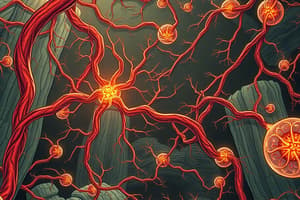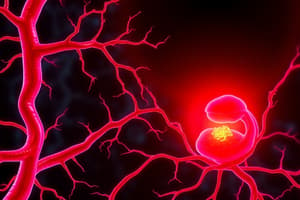Podcast
Questions and Answers
What is the maximum distance cells can be from a blood vessel to receive adequate oxygen and nutrients?
What is the maximum distance cells can be from a blood vessel to receive adequate oxygen and nutrients?
- 50-100 µm
- 100-200 µm (correct)
- 300-400 µm
- 200-300 µm
What triggers the accumulation of HIF-1a in tumor cells?
What triggers the accumulation of HIF-1a in tumor cells?
- Nutrient deprivation
- Increased blood flow
- Hypoxia (correct)
- Excess oxygen
What is the primary function of VEGF in angiogenesis?
What is the primary function of VEGF in angiogenesis?
- To induce apoptosis in tumor cells
- To enhance blood vessel leakage
- To promote endothelial cell growth (correct)
- To trigger necrosis in hypoxic areas
What do tip cells form during angiogenic sprouting?
What do tip cells form during angiogenic sprouting?
How does the vascular structure in cancer differ from normal angiogenesis?
How does the vascular structure in cancer differ from normal angiogenesis?
What is the role of VHL in relation to HIF-1a?
What is the role of VHL in relation to HIF-1a?
What happens when two tip cells meet during angiogenesis?
What happens when two tip cells meet during angiogenesis?
Which of the following characterizes cancer-induced vasculature?
Which of the following characterizes cancer-induced vasculature?
What is one reason why cancer cells induce angiogenesis?
What is one reason why cancer cells induce angiogenesis?
Which oncogene is mentioned as an activator of VEGF?
Which oncogene is mentioned as an activator of VEGF?
How does the loss of p53 affect angiogenesis?
How does the loss of p53 affect angiogenesis?
What term describes the formation of vessel-like channels by tumor cells?
What term describes the formation of vessel-like channels by tumor cells?
What role do endothelial progenitor cells from the bone marrow play in angiogenesis?
What role do endothelial progenitor cells from the bone marrow play in angiogenesis?
What percentage of tumor endothelial cells are derived from circulating endothelial progenitor cells?
What percentage of tumor endothelial cells are derived from circulating endothelial progenitor cells?
Which statement correctly describes the angio-genic switch in cancer?
Which statement correctly describes the angio-genic switch in cancer?
What major mechanism is involved in vasculogenesis?
What major mechanism is involved in vasculogenesis?
What does the 'seed' represent in the seed and soil hypothesis?
What does the 'seed' represent in the seed and soil hypothesis?
Which step in the metastatic cascade involves the cell acquiring malignant characteristics?
Which step in the metastatic cascade involves the cell acquiring malignant characteristics?
Which common site is most frequently associated with breast cancer metastasis?
Which common site is most frequently associated with breast cancer metastasis?
Which process describes the transition of epithelial cells to a more mobile mesenchymal phenotype during metastasis?
Which process describes the transition of epithelial cells to a more mobile mesenchymal phenotype during metastasis?
What does the term 'soil' refer to in the context of the seed and soil hypothesis?
What does the term 'soil' refer to in the context of the seed and soil hypothesis?
What is the fifth step in the metastatic cascade?
What is the fifth step in the metastatic cascade?
Which cancers are primarily known to metastasize to the brain?
Which cancers are primarily known to metastasize to the brain?
Which step follows 'Intravasation' in the metastatic cascade?
Which step follows 'Intravasation' in the metastatic cascade?
What is the role of VEGF in angiogenesis?
What is the role of VEGF in angiogenesis?
Which of the following is considered an endogenous inhibitor of angiogenesis?
Which of the following is considered an endogenous inhibitor of angiogenesis?
Angiostatin functions by binding to which type of cell?
Angiostatin functions by binding to which type of cell?
What is the significance of VEGFA and VEGFR2 in the angiogenic pathway?
What is the significance of VEGFA and VEGFR2 in the angiogenic pathway?
How does an increase in angiogenic activators affect angiogenesis?
How does an increase in angiogenic activators affect angiogenesis?
What molecule is cleaved from plasminogen to release an angiogenic inhibitor?
What molecule is cleaved from plasminogen to release an angiogenic inhibitor?
Which factors are described as promoting angiogenesis?
Which factors are described as promoting angiogenesis?
What is the relationship between VEGF and tumor cells?
What is the relationship between VEGF and tumor cells?
What is the key activator for angiogenesis in tumors?
What is the key activator for angiogenesis in tumors?
Which hypothesis describes the behavior of metastasis in cancer?
Which hypothesis describes the behavior of metastasis in cancer?
What process includes recruiting cells from the bone marrow to form new blood vessels?
What process includes recruiting cells from the bone marrow to form new blood vessels?
Which of the following is NOT a mechanism associated with tumor angiogenesis?
Which of the following is NOT a mechanism associated with tumor angiogenesis?
Which of the following best defines metastasis?
Which of the following best defines metastasis?
What term is used to describe the complex process that enables successful colonization and growth of metastatic tumors?
What term is used to describe the complex process that enables successful colonization and growth of metastatic tumors?
What is the major cause of clinical mortality in cancer patients?
What is the major cause of clinical mortality in cancer patients?
Who proposed the seed and soil hypothesis of metastasis?
Who proposed the seed and soil hypothesis of metastasis?
Flashcards are hidden until you start studying
Study Notes
Angiogenesis
- Angiogenesis is a balance of angiogenic inhibitors and activators.
- An increase in activators, such as VEGF, promotes the "angiogenic switch" to "on".
- VEGF (Vascular Endothelial Growth Factor) is the main activator of angiogenesis.
- VEGF binds to receptors on endothelial cells, triggering migration and proliferation.
- The main signaling pathway for angiogenesis involves VEGFA and VEGFR2.
- VEGFA is secreted by tumor cells.
- Angiostatin is an endogenous inhibitor of angiogenesis, which is released when plasminogen is cleaved.
- Angiostatin binds to receptors on endothelial cells, preventing angiogenesis.
Angiogenesis in Cancer
- Cancer cells require access to oxygen and nutrients, which are supplied by blood vessels.
- Cells must be within 100-200 µm of a blood vessel to receive sufficient oxygen and nutrients.
- Tumor cells in the core, which lack access to oxygen and nutrients, die by necrosis.
- Hypoxia (low oxygen) stimulates tumor cells to produce VEGF, which promotes angiogenesis.
- The VHL (von Hippel Lindau) protein degrades HIF1a (hypoxia-inducible factor) when oxygen levels are normal.
- Under hypoxia, HIF1a accumulates, inducing VEGF expression.
Process of Angiogenic Sprouting
- Binding of VEGF induces the formation of an endothelial cell "tip cell" at the forefront of a sprout.
- Proliferating stalk cells located behind the tip cell extend the sprouting vessel.
- The growing sprout follows a VEGF gradient.
- When two tip cells meet, they fuse, creating a lumen that allows blood to flow.
Vasculature in Cancer
- Vasculature in cancer is abnormal compared to normal angiogenesis.
- It is characterized by leakiness, tortuosity, disorganization, inadequate flow, and direct entry for cancer cells into the circulation.
How Do Cancer Cells Induce Angiogenesis?
- Cancer cells can induce angiogenesis by:
- Creating areas of hypoxia due to rapid growth.
- Activating oncogenes, including EGFR, Src, and Ras, which all activate VEGF.
- Loss of tumor suppressor genes:
- Loss of VHL increases HIF1a activity.
- Loss of p53 results in the absence of Thrombospondin, an angiogenesis inhibitor.
Other Angiogenic Mechanisms
- Vascular mimicry:
- Tumor cells imitate blood vessels, forming vessel-like channels.
- Cancer cells also can grow through a leaky matrix of tumor bed.
- Vasculogenesis:
- Recruitment of endothelial progenitor cells from bone marrow.
- These cells differentiate and contribute to the tumor neovasculature.
- 40% of tumor endothelial cells are from circulating endothelial progenitor cells derived from bone marrow.
Metastasis
- Metastasis is the spread of cancer cells from the primary tumor to other parts of the body.
- The seed and soil hypothesis explains metastasis, stating that certain cancers favor specific organs for metastasis.
- The metastatic cascade outlines the steps involved in successful metastasis.
The Metastatic Cascade
- The metastatic cascade consists of the following steps:
- Developing a metastatic cell.
- Motility and invasion.
- Intravasation (entering the bloodstream).
- Dissemination and transport.
- Cellular arrest, vascular adhesion, and extravasation (exiting the bloodstream).
- Colonization.
Developing a Metastatic Cell
- The cell acquires more malignant oncogene activation, altering its behavior.
Motility and Invasion
- The cell acquires the ability to break down the basement membrane (e.g., collagen) and migrate.
- This involves epithelial-to-mesenchymal transition (EMT).
Metastasis Hallmarks
- Metastasis is influenced by both tumor cell and tissue-specific factors.
Conclusions
- Tumors utilize angiogenesis to recruit their own blood supply.
- VEGF is pivotal in activating angiogenesis.
- Other angiogenic mechanisms include vascular mimicry and vasculogenesis.
- Metastasis is a major cause of mortality in cancer patients.
- The seed and soil hypothesis outlines the organ-specific nature of metastasis.
- The metastatic cascade clarifies the sequential steps involved in successful metastasis.
Studying That Suits You
Use AI to generate personalized quizzes and flashcards to suit your learning preferences.



